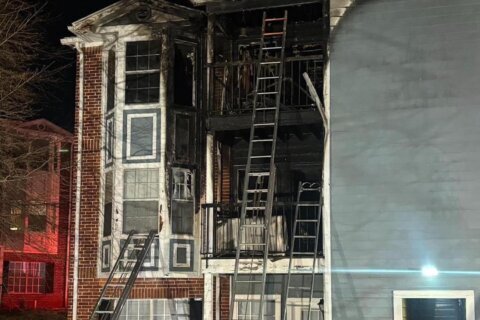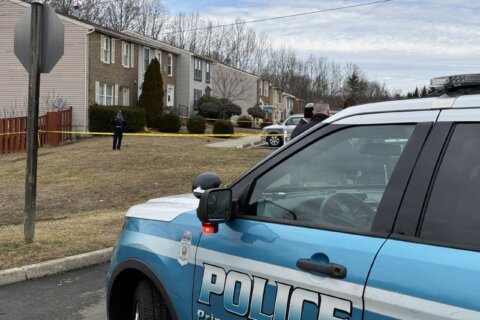Kashif Bashir, the former cabdriver who was found not guilty by reason of insanity in the 2013 shooting of Alexandria, Virginia, police officer Peter Laboy and released from a mental hospital has been sentenced to life in prison Thursday for torching the home of his therapist while she was inside.
In January 2022, Bashir, 36, of Woodbridge, pleaded guilty to the felonies of arson of an occupied dwelling, which carries a sentencing range of five years to life in prison, and making false statements on a criminal history check, ranging from one to 10 years behind bars.
Bashir pleaded guilty to misdemeanors of possession of a firearm by an acquitted insane person and unauthorized use of a tracking device as well.
Listing words he’d jotted when reviewing evidence, Prince William County Circuit Court Judge Carroll Weimer, Jr. included “disturbing, devious, chilling, bizarre, dangerous, evil, and troubled.”
“He’s obviously intelligent, he planned these things very well,” Weimer said, in announcing his sentence.
Prosecutor Teresa Polinske said the sentencing guidelines for Bashir called for one to three years behind bars. “They are woefully inadequate,” she said.
”This was the defendant’s revenge plot for those who rejected his affections during the course of his treatment,” she said. The crimes happened shortly after Bashir was confronted about inappropriate attention and behaviors with his female providers.
One provider, Kristen Durbin, said Bashir refused food so he’d be transferred to a hospital: “He feigned symptoms because he wanted to be around women and wanted better food.”
Bashir was found not guilty by reason of insanity in the 2013 shooting of Laboy, who barely survived the shooting and has undergone several surgeries. Laboy was shot in the head while assisting a young woman whom Bashir was stalking.
In 2018, an Alexandria judge released Bashir from a mental hospital with conditions. Eight months later, he was charged with setting fire to the home of a Prince William County mental health provider, Elizabeth Dugan.
Dugan testified during sentencing, saying the incident “changed a lot of things for me.” She told the judge, “I’m not comfortable working with clients anymore,” and expressed concern for her family.
Before his guilty plea, Bashir, had undergone psychological testing several times to determine his competency to stand trial, as well as whether he was insane at the time of the arson.
At the time of Laboy’s shooting, Bashir had been diagnosed as paranoid schizophrenic.
However, the mental health professionals during Thursday’s sentencing said he had never displayed hallucinations during his treatment in Prince William County, and had more recently been diagnosed as malingering, or faking mental illness.
On Jan. 18, 2022, Bashir told the judge he was pleading guilty, rather than going to trial, because he was guilty of arson. Wearing an orange jump suit and a mask, Bashir listened intently to questions posed by Circuit Court Judge Carroll Weimer Jr. and answered politely as the judge made sure he understood the ramifications of entering a guilty plea.
Bashir, who was forbidden from purchasing or possessing a gun as part of his conditional release, had skirted the law by buying a 9 mm pistol at the Dale City Gun Show. As it was a private sale, Bashir was not subject to a background check.
From the gun show, Bashir took an Uber to the Sharpshooters Range, in Lorton, where he purchased a silencer, one hour of range time and earplugs.
“He knew where that was, because that’s where he bought the firearm he used to shoot Officer Laboy,” Polinske told the judge. Laboy was present in the courtroom when Bashir admitted his guilt.
Thursday, Laboy was the last witness to testify about the impact of Bashir’s actions in the Prince William case.
Polinske asked if Laboy was concerned, because Bashir had bought two weapons, and had done internet searches for Laboy’s personal information, including home address.
”I’m worried that he’d try to get to my family, and the people I work with,” Laboy said, saying “he was released and it didn’t take him too long,” to be arrested after a judge released Bashir from the mental hospital.
”There’s no guarantee he won’t do it again,” Laboy said.
In closing arguments, defense attorney Taso Saunders told the judge he believed the sentencing guidelines of one to three years were “more than appropriate.”
”Mr. Bashir is a young man who needs help. He is delusional — he believes he can do things without consequence. But a life in prison does not solve the problem. Mr. Bashir is not a danger — he requires additional treatment,” said Saunders.
Weimer disagreed. “Today we heard from professionals who said they did all they could do, and it didn’t work. Rehabilitation is not an option in this case.”
”I’m going to deviate from the guidelines, which are woefully inadequate given the serious nature of what we’ve heard. The defendant is dangerous. Incarceration of the defendant is appropriate to protect the public, and nothing but incarceration,” Weimer said.
Asked if he wanted to say anything, Bashir spoke quietly: “I feel bad for what happened. I should have asked for help.”
Weimer sentenced Bashir to life in prison for arson of an inhabited building, 10 years for making a false statement on a background check, one year for having a firearm after being ruled insane. He was also fined $100 for having an unauthorized tracking device.
Defense attorney Saunders said he planned to appeal.








